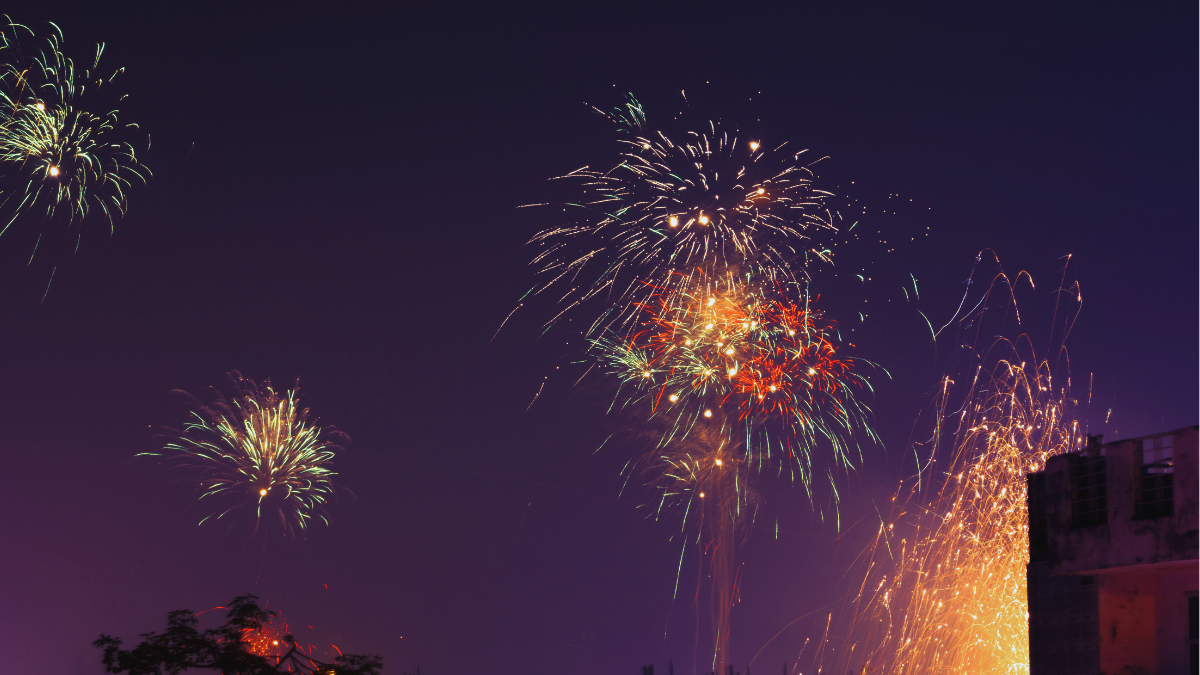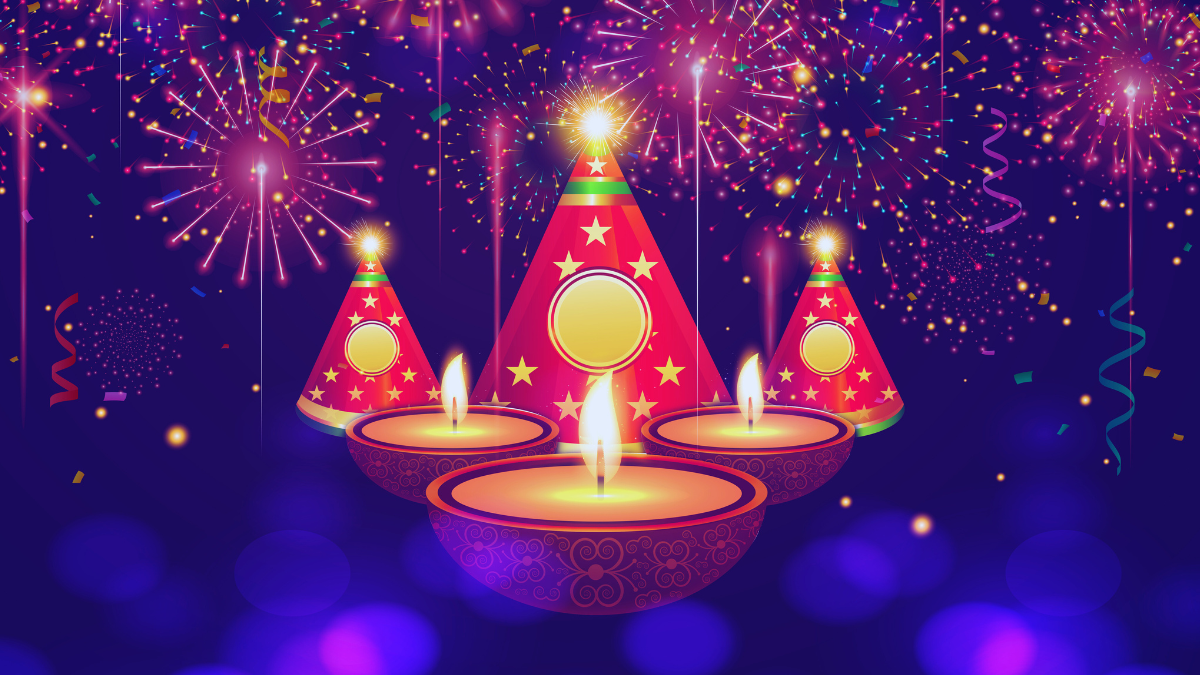Diwali Essay in English: Diwali, also known as Deepavali, is one of the most significant and widely celebrated festivals in India. Often referred to as the "Festival of Lights," Diwali symbolizes the victory of light over darkness and good over evil. It is celebrated with great enthusiasm, joy, and devotion by Hindus, Sikhs, Jains, and even some Buddhists across the world. The festival's name is derived from the Sanskrit words "deepa," meaning "lamp," and "avali," meaning "row," which collectively translates to "a row of lights." This essay delves into the history, significance, rituals, and cultural aspects of Diwali.
Diwali Essay in English for Students
Another significant legend associated with Diwali is the story of Lord Krishna and the defeat of the demon Narakasura. Narakasura was a tyrant who had imprisoned 16,000 women. Lord Krishna defeated him and freed the women, and this victory is celebrated as Naraka Chaturdashi, a day before Diwali.
For Jains, Diwali marks the day Lord Mahavira, the last Tirthankara, attained Nirvana or liberation. Sikhs celebrate Diwali as the day Guru Hargobind Ji was released from imprisonment by the Mughal emperor Jahangir, along with 52 other princes.
Religious and Cultural Significance
The festival also signifies the start of the new year in many regions of India. It is a time for introspection, renewal, and making new resolutions. People buy new clothes, exchange gifts, and share sweets with loved ones, symbolizing the sharing of joy and the beginning of a prosperous year.
Rituals and Traditions
- Dhanteras: The first day of Diwali is dedicated to the worship of Dhanvantari, the god of health and Ayurveda. It is also an auspicious day to purchase new items, especially gold, silver, and kitchen utensils, symbolizing wealth and prosperity.
- Naraka Chaturdashi or Choti Diwali: This day commemorates the victory of Lord Krishna over Narakasura. It is marked by early morning rituals, including the application of scented oils and the lighting of diyas to ward off evil spirits.
- Lakshmi Puja: The third day is the main day of Diwali, dedicated to the worship of Goddess Lakshmi. Families perform elaborate rituals, offer prayers, and light oil lamps to invite the goddess into their homes. Fireworks and crackers are burst to celebrate the occasion, although there is a growing awareness about the environmental impact of these practices.
- Govardhan Puja: The fourth day is celebrated in honor of Lord Krishna's lifting of Mount Govardhan to protect the villagers from torrential rains. This day is also known as Annakut, where food offerings are made to the deities.
- Bhai Dooj: The fifth and final day of Diwali is dedicated to the bond between brothers and sisters. Sisters pray for their brothers' well-being and longevity, while brothers vow to protect their sisters.
Diwali Celebrations Across India
In South India, Diwali is known as Deepavali and often involves early morning rituals, with people taking oil baths and wearing new clothes. The festival in Tamil Nadu, Karnataka, and Andhra Pradesh is associated with the defeat of Narakasura by Lord Krishna.
In Maharashtra, the festival begins with Vasu Baras, dedicated to the worship of cows, considered sacred. Diwali is also marked by the preparation of a special sweet called "faral," which includes delicacies like chakli, karanji, and laddoos.
The Environmental Impact of Diwali
In recent years, there has been a growing movement towards celebrating an eco-friendly Diwali. People are becoming more conscious of the need to reduce pollution and are opting for alternatives such as LED lights, organic rangoli colors, and biodegradable decorations. Some communities are also encouraging the use of traditional oil lamps and diyas instead of electric lights to reduce energy consumption.
Diwali and Social Unity
In urban areas, where people often lead busy lives, Diwali provides an opportunity for reconnecting with loved ones. It is a time to visit friends and relatives, exchange gifts, and share festive meals. The tradition of giving and receiving gifts during Diwali strengthens social ties and promotes goodwill.
Global Celebrations of Diwali
Diwali is not confined to India alone; it is celebrated by the Indian diaspora around the world. In countries like Nepal, Sri Lanka, Malaysia, Singapore, and Mauritius, Diwali is a public holiday, and the celebrations are marked with similar fervor as in India. In countries like the United States, Canada, the United Kingdom, and Australia, Diwali has gained recognition as a cultural festival, with grand events organized by Indian communities.
Major cities across the world, including London, New York, and Sydney, light up with Diwali festivities, featuring fireworks, cultural performances, and community feasts. These global celebrations highlight the festival's universal appeal and its role in promoting cultural exchange and understanding.
Conclusion
Diwali is a festival that transcends religious boundaries, bringing people together to celebrate the universal values of light, hope, and prosperity. It is a time to reflect on the triumph of good over evil, the importance of family and community, and the need for environmental consciousness. As we light lamps and share sweets during Diwali, let us also light up our hearts with compassion, kindness, and a commitment to making the world a better place for all.
Diwali is a reminder that no matter how dark the times may seem, the light of hope and goodness will always prevail. By embracing the true spirit of Diwali, we can contribute to a brighter, more harmonious world, where joy and prosperity are shared by all.
We hope that you enjoyed reading diwali essay in english. If you have any queries or issues, please feel free to connect with us on our Facebook page. We are always happy to help and would love to hear your feedback. Thank you for taking the time to read our blog, and we look forward to hearing from you soon.







